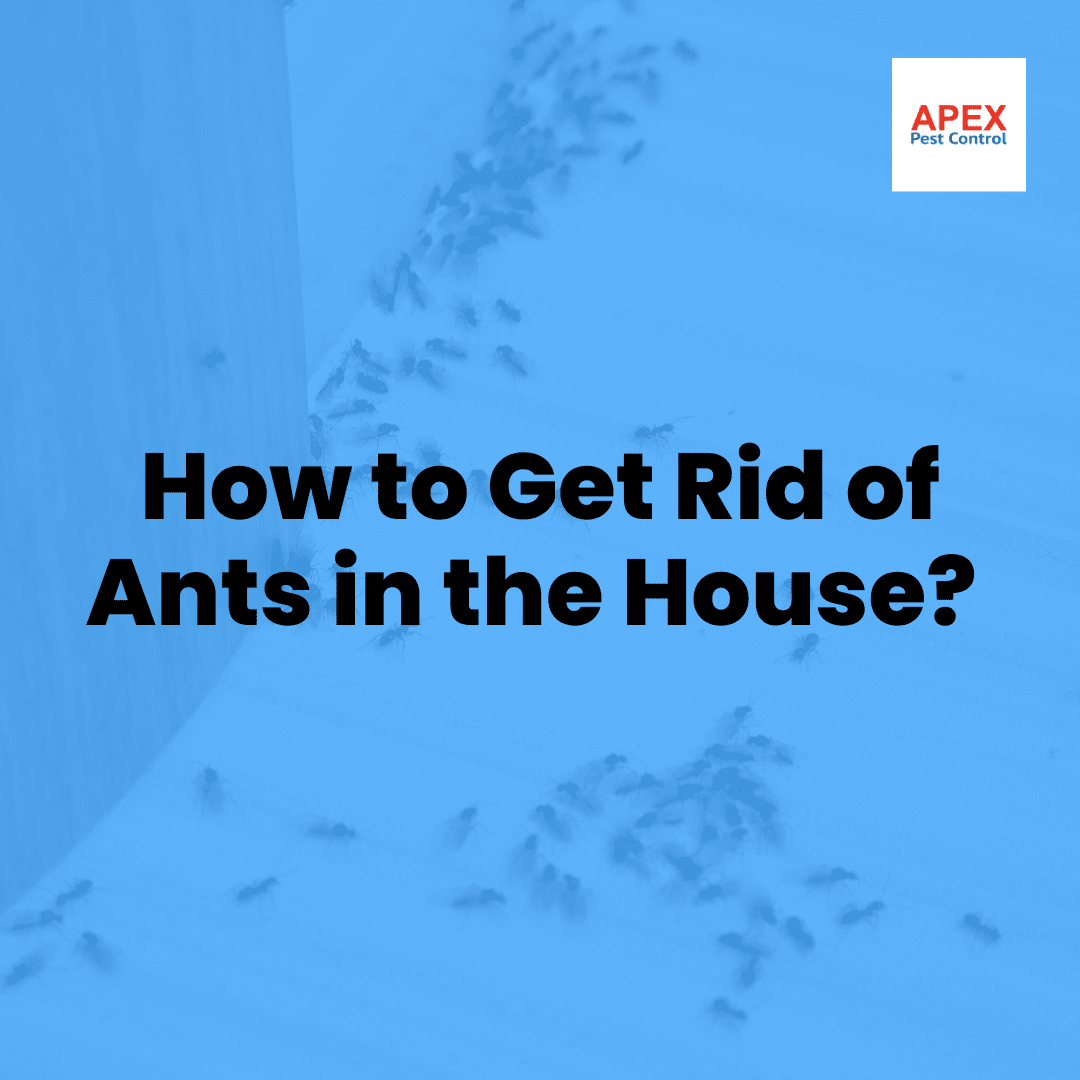How to Get Rid of Ants in the House?
Having ants inside your home can be an unwelcome hassle. Whether they’re infiltrating your kitchen, living room, or even bedroom, ants can be a nuisance that disrupts daily life.
Let’s dive deep into understanding these tiny invaders and exploring the tools and methods available to make your home an ant-free haven.
We want to help you have an understanding of these insects and how to get rid of ants from your home.
Identifying Common Household Ants
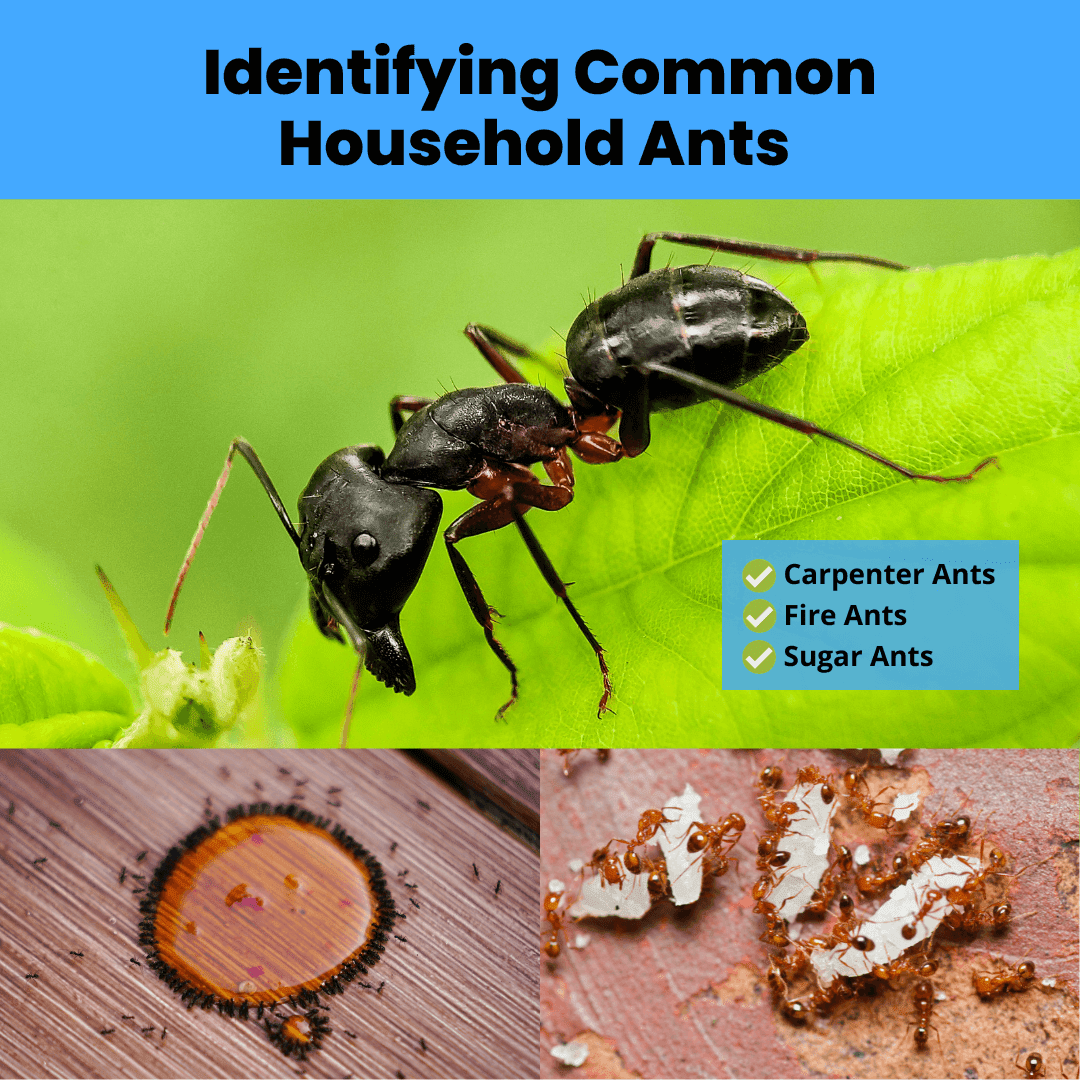
Targeting and eliminating ants depends on their proper identification. The most common household ants include:
- Black Ants
- Yellow Meadow Ant
- Red Wood Ant/Horse Ant (formica rufa)
- Carpenter ants
- Fire ants
- Sugar ants.
Each species has unique characteristics which can cause damage and danger to your home.
Familiarity with these ants helps you to take proper actions and prevent infestations.
Black Ant
The most famous ant in England is the black garden ant, Lasius niger. It enters houses a lot. Colonies can have up to 15,000 workers, but usually have around 4,000 to 7,000. They like sweet things like honey, sugar, and fruit.
Yellow Meadow Ant
Yellow meadow ants, Lasius flavus, are common in gardens. They make small mounds in our lawns and are often mistaken for red ants due to their yellow-orange colour. They are not more harmful than their common black cousins, Lasius niger.
They are skilled nest builders. They can also be found in fields and meadows where they build much larger mounds. They feed on small insects and mites that stray into their tunnels.
Red Wood Ant/Horse Ant (formica rufa)
The largest ant in the UK is Formica sanguinea. It raids colonies of other Formica species, such as Formica fusca and steals their brood, taking them back to their own nest where they raise the hatching workers as their own.
Formica rufa are polygynous and can have hundreds of egg laying queens in one nest. They are found in Southern England as well as other European countries.
Carpenter Ants
Carpenter ants are one of the larger kinds of ants. They target wood structures in houses, causing unusual damage. Carpenter ants are usually black but also in shades of red and yellow. They mostly live outside, but wet wood inside houses can attract them.
If you find carpenter ants inside your home, it’s important to do something quickly. It’s a good idea to get a professional to help get rid of them. They know the best ways to handle these ants and keep them from damaging your house.
Fire Ants
Fire ants are known for their painful bites. You’ll often find them outside in places like yards or parks, and they build large mounds. Now, if they find a way, they can come into your house.
When they bite, it starts with a burning feeling. Then, your skin will show red spots that turn into itchy white bumps. This can be especially bad for some people or pets.
To keep them away, use things like ant sprays or traps. Cleaning up around your house can help stop ants from getting in. If there are too many, you might need a professional exterminator.
Sugar Ants
Sugar ants, which some people call pavement ants, are tiny ants that can be brown or black. You’ll often find them making their nests in cracks in the pavement. They love sweet stuff, so if they find sugary foods in your home, they’ll come right in for a snack.
Even though they might seem small and not harmful, they can bring bad bacteria into your house, which isn’t good for your health.
To keep these ants out, make sure you store your food the right way and keep your kitchen clean. If you don’t leave food out, especially the sweet kind, these ants won’t have a reason to enter. Stopping their main food source is a good way to avoid an ant infestation.
Factors Attracting Ants Indoors
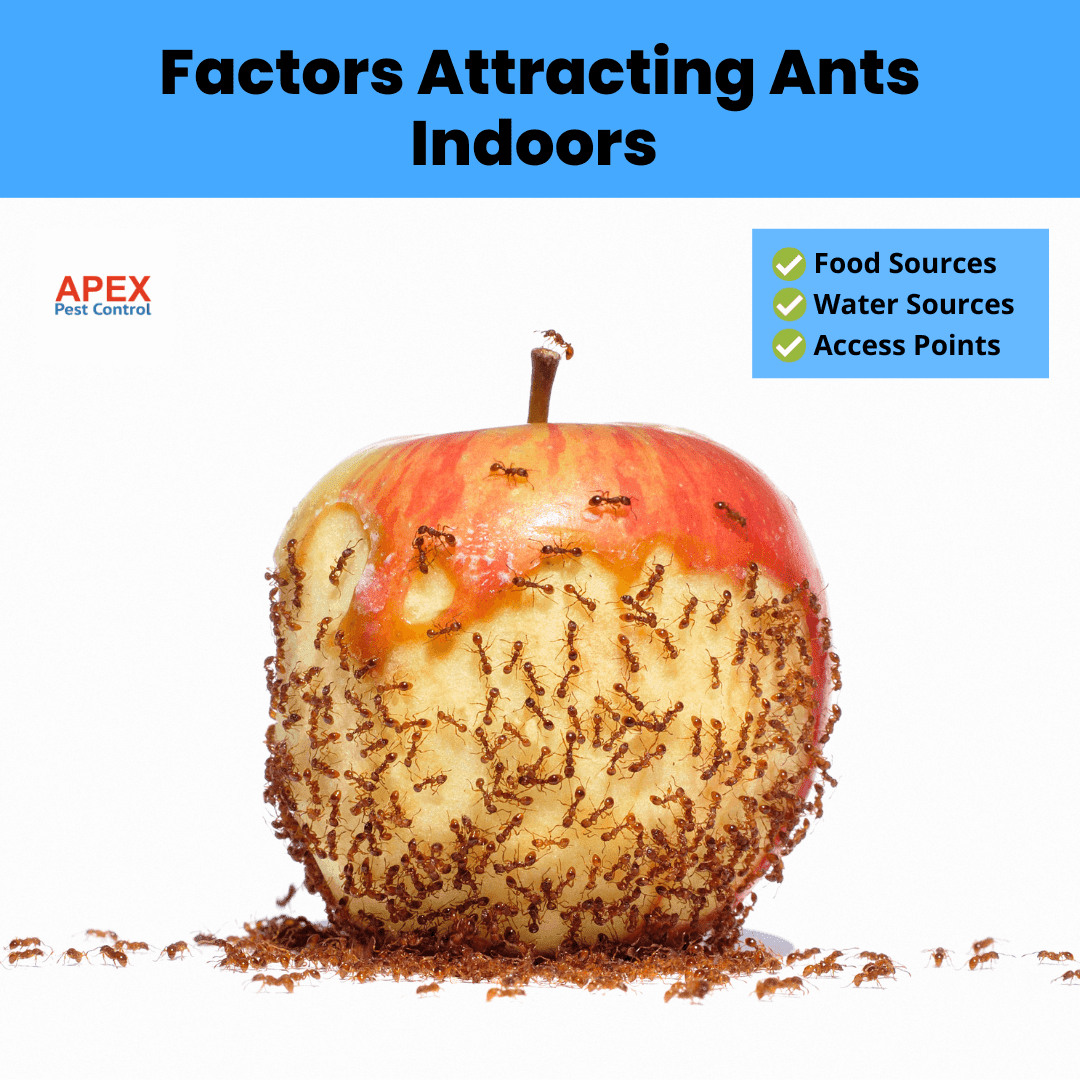
Understanding the factors attracting ants indoors is key to their elimination and prevention. Food sources, water sources, and access points all contribute to the presence of ants in your home.
Addressing these factors creates a home less appealing to ants and reduces the risk of an infestation.
Food Sources
Ants are attracted to food, especially sweet and sticky items. When one ant locates a source of sweet smell, it creates a scent trail that guides the rest of the colony to the area.
Securing food in sealed containers or plastic bags prevents ants from eating food in your home. Proper food storage will not only keep ants at bay but also deter other pests.
Regular cleaning is also crucial for eliminating food sources for ants. Ensure cleanliness by wiping surfaces and vacuuming carpets and furniture. By maintaining a clean house, you can disrupt ant trails and remove any food remains that may attract ants.
Water Sources
Like all living creatures, ants need water to survive. Eliminating standing water and fixing leaks in your home can help in preventing ants. Common water sources include leaks in pipes, water from potted plants, condensation in bathrooms, and pet water dishes. Address any leaks, empty pet water bowls, and remove any potted plants that are collecting water.
If you have a persistent leak issue, contacting a plumber or using a DIY repair kit can help resolve the problem. By eliminating water sources, you can reduce the chance of an infestation.
Access Points
Prevent ants from entering your home by sealing entry points such as cracks, gaps, and other openings. Typical entry points for ants indoors may include minor cracks.
Minor cracks can be found in the foundation, openings under doors, sealed windows, and walls. To seal these entry points, use caulk, foam, or other sealants to fill in gaps.
Regularly inspect your home for potential entry points. Managing any damage can help maintain a sealed environment. By sealing entry points, you can protect your home against ants and other pests.
Non-Toxic Methods for Eliminating Ants
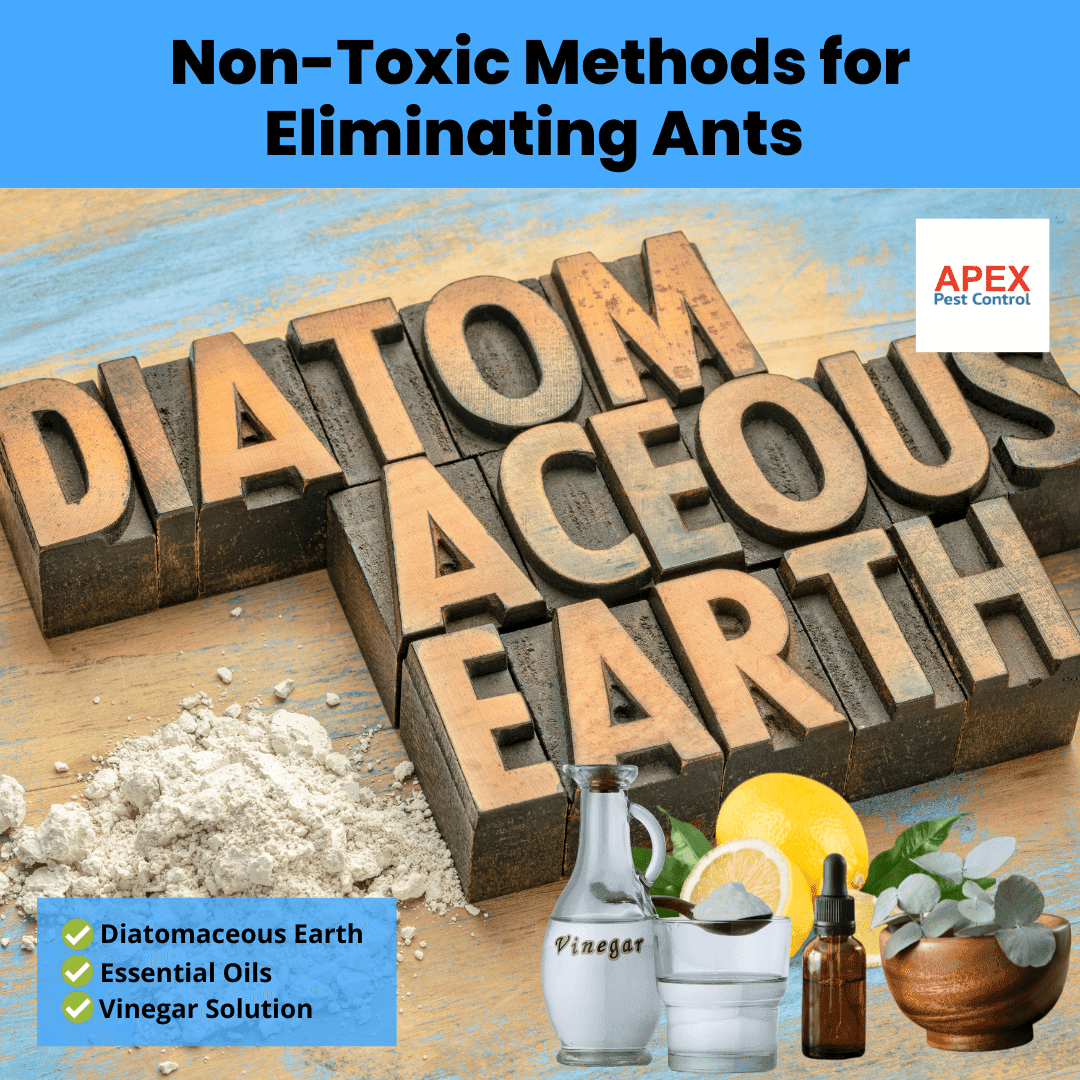
Several non-toxic methods are available for those preferring a more natural approach to ant control. Diatomaceous earth, boric acid, essential oils, and vinegar solutions are all effective options that do not rely on harsh chemicals.
Utilising these non-toxic methods allows you to maintain an ant-free home while ensuring a safe environment for your family and pets.
Diatomaceous Earth
Diatomaceous Earth, commonly known as DE, is a fine powder from ancient water plants. It’s not harmful to humans or pets, but it’s deadly for ants. When they crawl over diatomaceous earth (DE), it takes away the protective oils from their bodies, and they dry out.
If you see ant paths or nests, sprinkle diatomaceous earth there. Be extra safe and get the kind labelled “food grade” if you have kids or pets around.
To utilise diatomaceous earth to eliminate ants, simply follow these steps:
- Apply diatomaceous earth around your home, focusing on areas where ants are present.
- Be sure to follow the directions on the package for optimal results.
- Consider using food-grade diatomaceous earth for added safety.
Essential Oils
Essential oils like peppermint, cinnamon, and lemon can be used as natural ant repellents. Ants hate certain scents, which can be used to deter them from entering your home.
To use essential oils like tea tree oil for ant control, mix a few drops of the oil with water in a spray bottle and apply it to the source of the ant problem or diffuse it through an oil burner.
Be cautious when using essential oils around pets, as some may harm them. Consult a veterinarian before using essential oils in your home if you’re concerned about your pet’s safety.
Vinegar Solution
Ants hate the strong smell of vinegar. It messes up the scent trails they leave for other ants to follow. If you mix vinegar and water in equal parts in a spray bottle, you’ve got a simple solution. When you see any ant trails or a single lost ant, spray them. You can also spray in places they like to walk or where they enter your home.
But remember vinegar has a strong smell, and while it fades as it dries, some people might not like it. Some surfaces, like certain stones or wood, might not react well to vinegar, so it’s good to test a small hidden spot first.
To utilise a vinegar solution for ant control, simply:
- Mix equal parts white vinegar and water in a spray bottle.
- Apply the solution directly to ants, their nests, and any surfaces where ants have been observed.
- Be aware that vinegar may not be safe for all surfaces and may leave behind a vinegar smell.
Conventional Methods for Ant Control
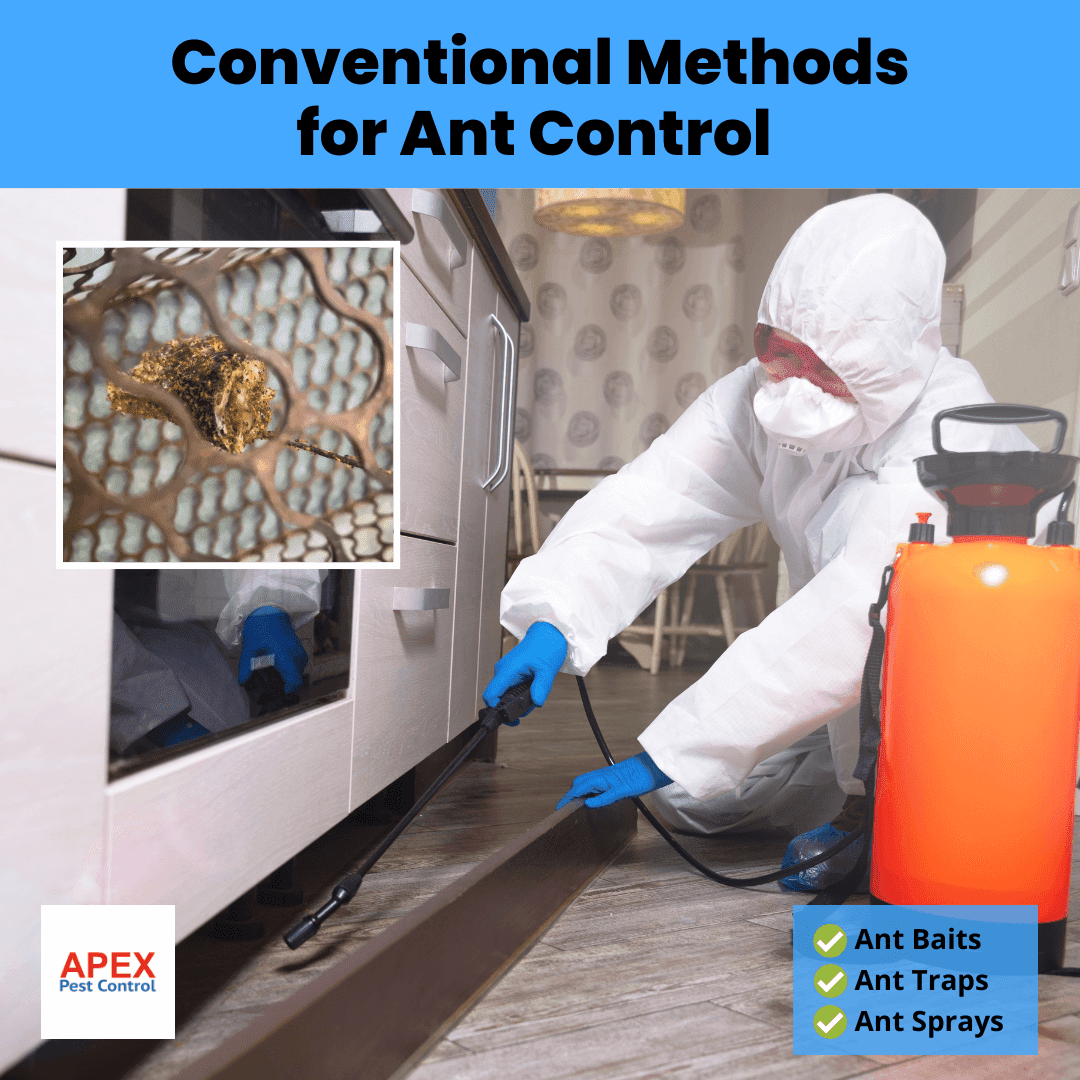
Conventional ant control options like ant baits, traps, and sprays can help eliminate ants in your home. To ensure safe and effective use, read and follow the instructions provided with the products.
Ant Baits
Ant baits are an effective method for eliminating ants in your home. These baits contain pesticides and attractants, killing the queen and other ants. The poison takes longer to take effect, worker ants can bring the bait back to the colony, where it kills them right away.
To use ant baits, place them in areas where ants are likely to come, such as close to food sources or entry points. Keep the bait away from children and pets, as the poison can be harmful if eaten.
Ant Traps
Ant traps are another type of bait designed to kill ants. These traps contain a poison that eliminates ants and prevents them from escaping.
To use ant traps, place them near ant trails or areas where ants are likely to gain entry into your home. Keep the traps away from children and pets, as the poison can be harmful if swallowed.
Ant Sprays
Ant sprays can kill ants immediately and keep them from coming back. These sprays are effective for indoor and outdoor use. Ant sprays are especially good at getting rid of ants. In places like cracks, doorways, windowsills, edges of floors, and around trash bins. They offer a fast and handy way to handle ant issues.
To use ant sprays, apply them directly to ants and their nests, ensuring an even and thorough coverage. Be sure to read the instructions on the label for proper application and safety precautions.
Remember that ant sprays may contain chemicals, so it’s important to use them responsibly and keep them out of the reach of children and pets.
Keeping Them Out: Ant Prevention Measures
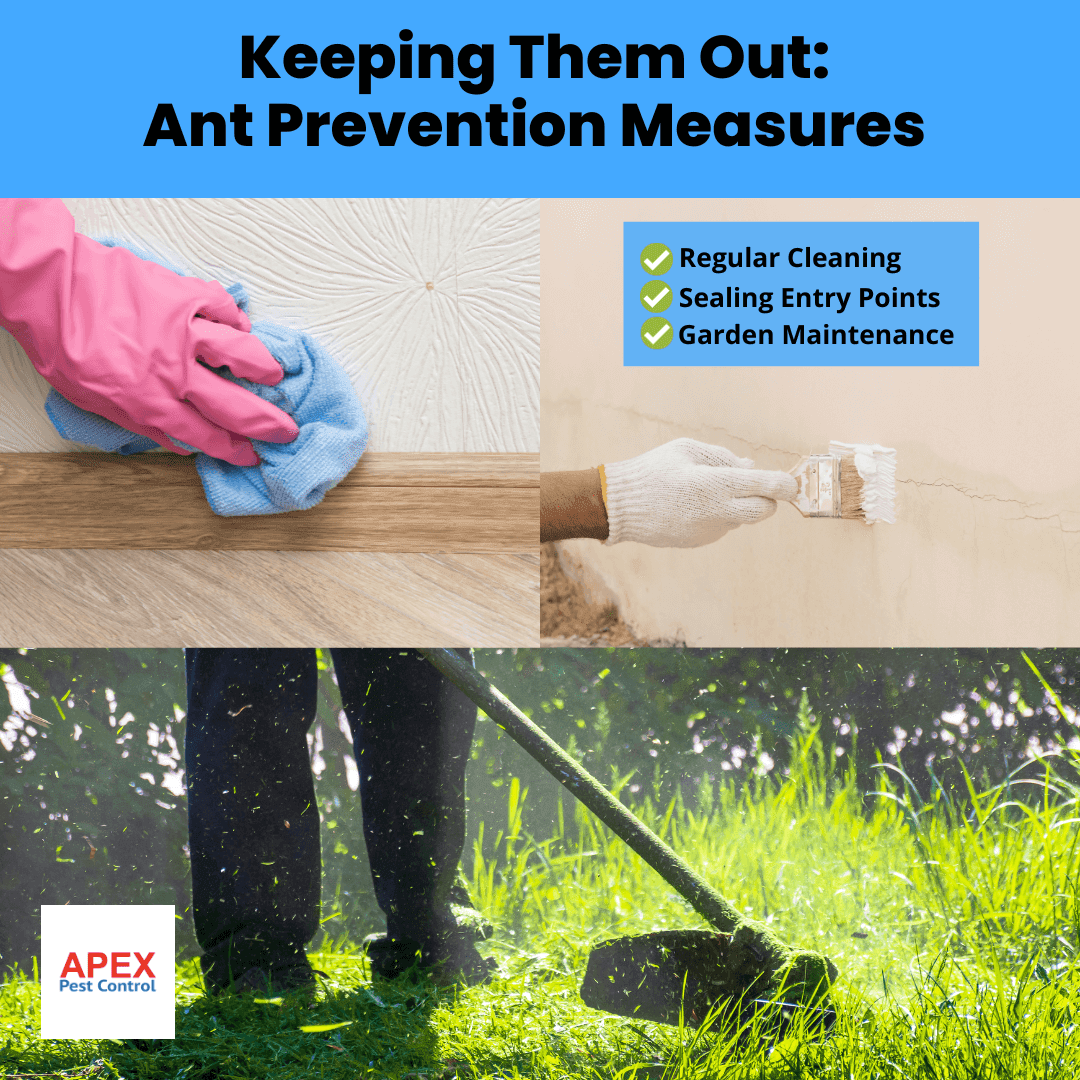
Once you’ve managed to get rid of ants in your home. Taking steps to prevent future infestations is important. Regular cleaning, sealing entry points, and yard maintenance can all help prevent ants.
Regular Cleaning
A clean home prevents ant infestations. Cleaning surfaces, wiping, and vacuuming carpets and furniture can help prevent ants. You can make an area less appealing to ants by blocking their tracks and removing food scraps.
Clean the surfaces and store food in sealed containers to stop ants in your home. Proper food storage and cleanliness can prevent future ant infestations.
Sealing Entry Points
To stop ants from getting into your home, make sure to seal any entry points like cracks and
small holes. It’s a good idea to check your home for these openings if any damage or areas is starting to wear out.
Use materials like caulk or foam to close up these gaps. This not only keeps the ants out but also other pests. By doing this, you reduce the chance of having any problems in the future.
Garden Maintenance
Keeping your garden clean is a good step to avoid ants getting too close to your home. When you cut back overgrown plants and clear out trash or leftover wood, you make your garden less attractive for ants to set up their homes.
Remember, ants can be good in some ways. They eat other bugs that we don’t like, help make the soil better, and even help break down things in the ground.
But, if there are too many ants close to our homes, it can become a problem. By keeping your garden tidy and dry, you reduce the chance of having too many ants around and facing a big ant problem later on.
When to Call the Professionals

Even with diligent home remedies, ants can continue to be a problem. When they do, professional intervention might be your best option.
Exterminators have deep knowledge of different ant species, from carpenter ants to fire ants. Beyond just identification, they understand ant behaviour, like their nesting habits and food sources. With this expertise, they pinpoint and address the root causes of an infestation, offering the best solutions.
A primary benefit of hiring professionals is safety. DIY might lead you to potent chemicals that can risk your family’s and pets’ well-being. Professional exterminators prioritise health, often opting for treatments that target ants but remain safe for humans and animals.
So, if ants keep returning despite your efforts, it’s time to call in the professionals. They’ll provide an effective, safe, and lasting solution to keep your home ant-free.
A Home Free of Ants
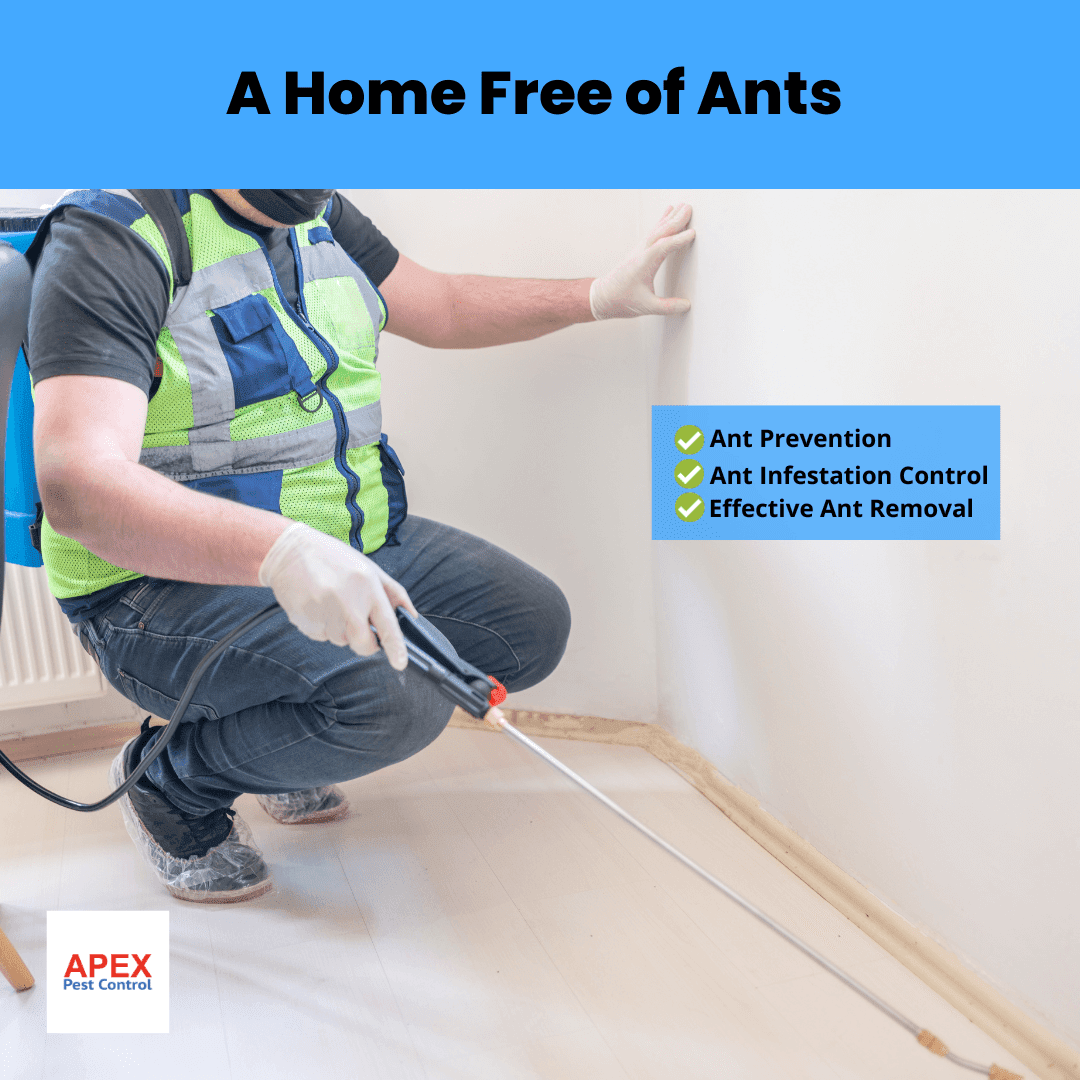
Getting rid of ants in the house combines understanding the specific problem you’re facing and applying the right solutions. Whether you’re reaching for natural remedies from your kitchen or seeking professional treatments, the goal is to create an environment where ants don’t feel welcome.
The key lies in understanding the specific ant species, employing effective treatments, and ensuring preventive measures. With consistency and diligence, a home free of ants is a very achievable reality.
FAQs
How do I permanently get rid of ants in my house?
To permanently remove ants, mix peppermint or lavender oil with water and spray it around areas where they enter. Keeping your living space clean and dry, with no accessible food, significantly reduces the chances of future infestations.
What causes ants in the house?
Ants mainly enter homes searching for food and shelter. Even tiny crumbs or a small spill can attract a lot of ants. They can also sneak in through small holes in walls or door gaps. A clean and well-maintained home reduces the risk of an ant infestation.
Can essential oils deter ants?
Yes, essential oils, like peppermint and tea tree, are effective against ants. These oils, when diluted with water and sprayed at entry points or infested areas, can repel them and even kill some species.
Is baking soda effective against ants?
Baking soda can be helpful against ants when mixed with sugar. Ants are drawn to the sugar, but the baking soda negatively affects their digestion, eventually killing them.
How often should I clean to prevent ants?
For best results, clean your home thoroughly at least once a week. Focus on removing any food residues or spills, as these are major attractants for ants.
Are there any specific plants that keep ants away?
Plants like peppermint and lemongrass have strong scents that ants tend to avoid. Growing these plants around your property can act as a natural barrier against ant invasions.

Tony Johnson, Founder & Lead Technician at Apex Pest Control, is a BPCA and NPTA accredited pest management expert with over 35 years’ hands-on experience. Tony specialises in Integrated Pest Management and ensures all services comply with UK pest legislation, including the Wildlife and Countryside Act 1981 and COSHH Regulations 2002. His commitment to continual learning and adapting to industry best practices means clients receive effective, safe solutions for pests affecting homes and businesses across South Yorkshire. Tony’s dedication to professional standards, ethical treatment methods, and local expertise has made him a trusted partner for pest control and prevention.
-
BPCA & NPTA accredited | CHAS certified
-
Committed to UK pest law compliance & safety
-
Focused on effective, ethical pest management for South Yorkshire

